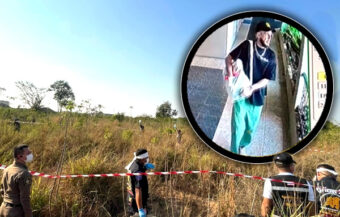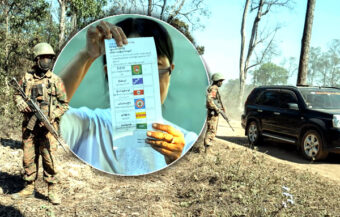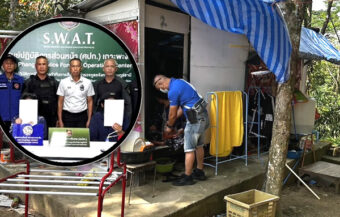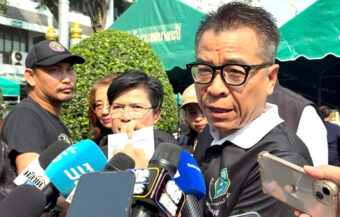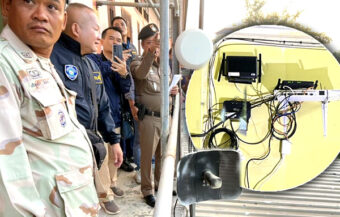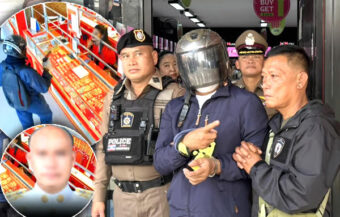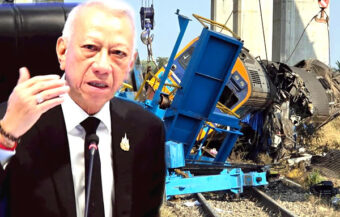Tourism chief blasts viral scam rumours as outdated and false—no new kidnappings, no deaths. Taiwan confirms victims entered Myanmar last year. Thailand steps up crackdown on cross-border syndicates and pivots to safer tourism, eyeing long-haul markets.
Thailand’s permanent secretary at the Ministry of Tourism and Sports moved swiftly on Tuesday to quash online media reports that revived and distorted old stories about scam compounds involving Taiwanese nationals. Ms. Natthriya Thaweevong made it clear the reports were both outdated and inaccurate. Meanwhile, Thailand’s foreign tourism numbers are reportedly improving as the country pivots toward more long-haul and European visitors. In response, government ministers, tourism agencies and the Royal Thai Police are working hard to prioritise the safety and security of all international tourists. At the same time, efforts to combat scam compound operations have intensified — not only in Myanmar but increasingly in Cambodia and Laos.

On June 3, Nattareeya Thaweewong, Permanent Secretary of Thailand’s Ministry of Tourism and Sports, addressed viral social media reports. The rumours claimed multiple Taiwanese tourists had recently disappeared after crossing from Thailand into Myanmar. However, Nattareeya insisted the information was both outdated and misleading. According to her, the incident happened months ago—back in January—not recently as many posts suggested.
After consulting the Ministry of Foreign Affairs, the Royal Thai Police, and local Tourism Authority offices, officials confirmed key facts. There were no deaths. The location cited in the posts was also incorrect. Crucially, the incident was not new.
Yet the distorted version continues to circulate, fanning fears and damaging Thailand’s reputation.
Taiwanese tourists were lured by a fake tour and trapped in a Myanmar scam compound for ransom payments
The Taipei Economic and Cultural Office (TECO) in Bangkok gave further clarification. Eight Taiwanese citizens had joined a so-called “free tour” late last year. They entered Myanmar from Thailand, believing it was a legitimate trip.
In reality, it was a trap. Once across the border, they were held inside a scam compound. Three of the eight later escaped—after paying ransoms of NT$300,000 each. These men returned safely to Taiwan. The remaining five chose to stay in Myanmar. According to TECO, they are profiting from the scam operations and have no wish to return home.
This revelation came at a precarious time for Thailand’s tourism industry. In early 2025, foreign tourism fell by 1.9% compared to last year. Even more striking was the 17% drop in tourists from key Asian markets—Taiwan, China, Hong Kong, South Korea, and Vietnam. Analysts point to a surge in negative news coverage.
Specifically, stories linking Thailand to human trafficking and scam syndicates operating across the Myanmar border have raised alarm, especially in Taiwan.
Thailand lost droves of Asian tourists after viral scam stories fueled tourism fear and mistrust in the region
Although European tourism has recently increased, Asian travel has declined sharply. Many Taiwanese now view Thailand as unsafe. That perception, officials warn, is hard to reverse. The Ministry of Tourism is trying to fight back and consequently rebuild trust.
According to Nattareeya, her team actively monitors online stories and coordinates with foreign affairs officers. They aim to respond quickly to false or exaggerated reports. “We’re not ignoring the situation,” she said. “But this specific case is being misrepresented.”
The broader problem extends beyond Thailand’s borders. Scam centres inside Myanmar’s border zones, especially in Myawaddy, have become hotbeds of organized crime. Syndicates lure victims with fake job offers and then traffic them across borders. Victims are locked inside guarded compounds. There, they are forced to commit online fraud—often under threat of beatings, starvation, or worse.
Hsieh Yueh-peng, one of the rescued Taiwanese, shared his ordeal publicly. A theatre performer by trade, he was duped by a fake gig on Facebook. He flew to Bangkok in December 2024 expecting a performance contract. Instead, men picked him up at the airport and drove him to the border. He was smuggled across the Moei River into Myanmar. There, he found himself inside a scam centre.
Lured by fake job ads, the trafficked Taiwanese artist describes his escape from a brutal scam compound
The gang gave him a script and a fake online identity. He was forced to pose as an investment consultant targeting Australians. If he refused, he was threatened with violence. He eventually escaped after someone paid a ransom of US$30,000. However, he still doesn’t know who paid. He believes online pressure may have forced the syndicate to release him. “They said I was sold,” he recalled. “But I didn’t know to who.”
His experience echoes a similar high-profile case involving Chinese actor Wang Xing. Wang was also tricked, trafficked, and detained in a scam compound.
He was freed only after his girlfriend launched an online campaign that gained global attention. Both men were used in digital fraud operations. Both were held under brutal conditions. And both were ultimately freed thanks to outside intervention and public exposure.
The recent media buzz began when the three returned Taiwanese gave interviews on local TV. TECO confirmed the details and praised Thai authorities for cooperating. Still, more information is expected in the coming weeks.
Taiwan’s government has also taken independent action. In February, the Ministry of Interior issued a travel warning. It listed Thailand, Myanmar, Cambodia, Vietnam, and Laos as high-risk scam zones.
Public rescues and viral stories drive Taiwan’s growing crackdown on scam syndicates in the region
Authorities didn’t stop there. Taiwan asked airlines to print scam alerts on all e-tickets. They also urged travellers to install a mobile safety app. The app sends alerts and tips to tourists while overseas. Taiwanese officials explained that over 200 citizens have been rescued from scam compounds in Southeast Asia. In February 2025, seven Taiwanese were among 260 foreigners rescued and brought to Thailand.
Thailand’s Cybercrime Investigation Bureau handled the legal side at that time. Deputy Commissioner Atthasit Sudsa-nguan expressed doubts about some victims’ claims. He noted that many said they were drugged in Bangkok before being trafficked over nine hours to Myanmar. “It doesn’t add up,” he said. He suspects some people may have gone willingly. Now, facing arrest, they claim to be victims to escape prosecution.
Nonetheless, Thai officials in association with Chinese police launched a crackdown. They cut electricity and fuel to scam compounds in Myanmar’s border towns in early February. This was to weaken operations without escalating tensions.
Still, Thailand remains in a difficult position. Over 35 million tourists visit annually. Authorities must ensure safety while protecting national reputation. According to Nattareeya, “We treat all reports seriously. We’re not standing still.”
Taiwan intensifies alerts as Thailand defends its role after cutting power to border scam compounds in February
Criticism rose in Taiwan as well. Mr. Hsieh, still recovering from nerve injuries caused by handcuffs, said help was slow. As a dual U.S. citizen, he contacted the American embassy—only to be met with silence. He said he’s unsure if his rescue came from government pressure or outside donors. “I just wanted to go home,” he said. “But nobody seemed to know what to do.”
Meanwhile, scam networks across Southeast Asia keep growing. Most are controlled by Chinese criminal syndicates. Their operations generate billions through fraud. Workers inside the compounds use AI tools and translation software. This allows them to deceive victims across multiple countries and languages.
They mainly target users on Instagram and niche sites like yeeyi.com. Their favourite method is the “pig butchering” scam. Scammers build online relationships and then trick victims into fake investments.
Meta, owner of Facebook and Instagram, has acknowledged the crisis. A company spokesperson said Meta has taken action. In 2024 alone, it shut down over 2 million scam-linked accounts. These accounts operated across Myanmar, Laos, Cambodia, the UAE, and the Philippines.
Meta also partnered with the Australian Financial Crimes Exchange to detect suspicious behaviour. It is now using facial recognition to identify trafficked victims in scam ads.
Scam networks use AI and social media to expand operations while tech firms race to shut them down
Thailand’s tourism ministry remains under pressure. Officials must calm international fears while keeping tourist arrivals steady. According to insiders, revenue from tourism is too critical to lose.
However, many believe more aggressive measures are needed. Until Myanmar’s border zones are secured and syndicates dismantled, the region will remain dangerous for jobseekers—and a risk for tourists passing through.
Indeed, there is an even larger scam compound industry in Cambodia. A 2023 United Nations Human Rights report suggested that up to 38% of Cambodia’s GDP is linked to these scam centre operations. Certainly, those involved have influence at the highest levels of the Khmer government.
Cambodian cybercrime industry run by Chinese criminals could be generating up to 38% of its GDP
Ung Ing finally gives the order. Thailand pulls the plug on scam centre electricity in Burma. Cut at 9 am
Tourism chief targets European tourists in the second half of 2025 while cabinet orders shorter visas for holidaymakers
The Ministry of Tourism says it will continue to verify each report in real-time. Misinformation will be challenged immediately. Officials are also working to strengthen coordination with foreign embassies. “Tourist safety is not just a slogan,” Nattareeya said. “It’s our job.”
As cases like Hsieh’s resurface in media across Asia, public concern remains high. So does the pressure on Thailand to prove its bona fides.
While much of the trafficking happens outside its borders, the routes often start on Thai soil. With tourism vital to its economy, Thailand is now walking a tightrope—between clarifying the truth, responsibility and effective policing.
Join the Thai News forum, follow Thai Examiner on Facebook here
Receive all our stories as they come out on Telegram here
Follow Thai Examiner here
Further reading:
Thaksin does not rule out joining talks in US as Thai team finalises plans. They fly out on Thursday
Trump’s remaking of World trade, if it works, will force Thailand to decide between the US and China
US offers a 90-day tariff pause but Thailand must move faster as it already faces shaved GDP in 2025
PM addresses the nation in shock over last week’s earthquake and this week’s Trump tariff bombshell


